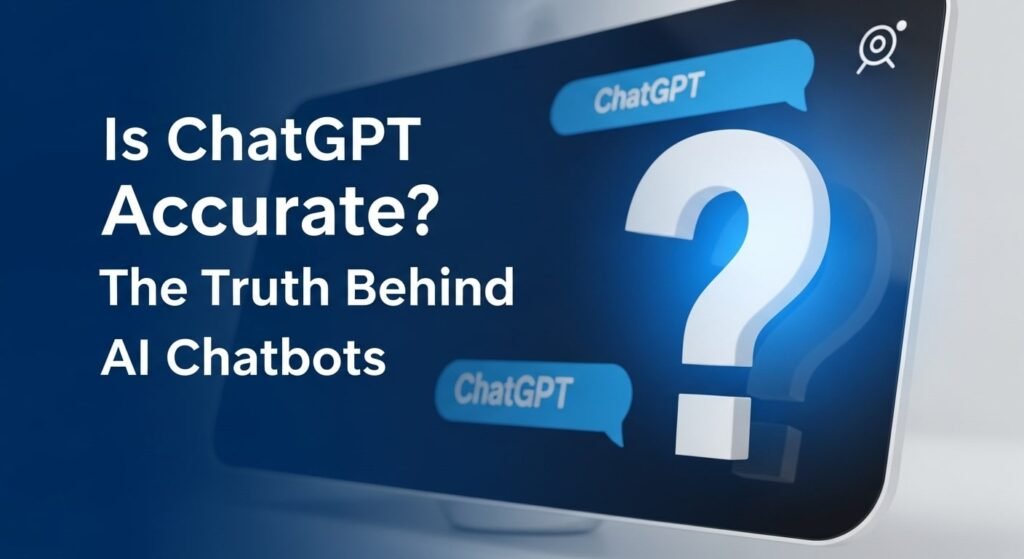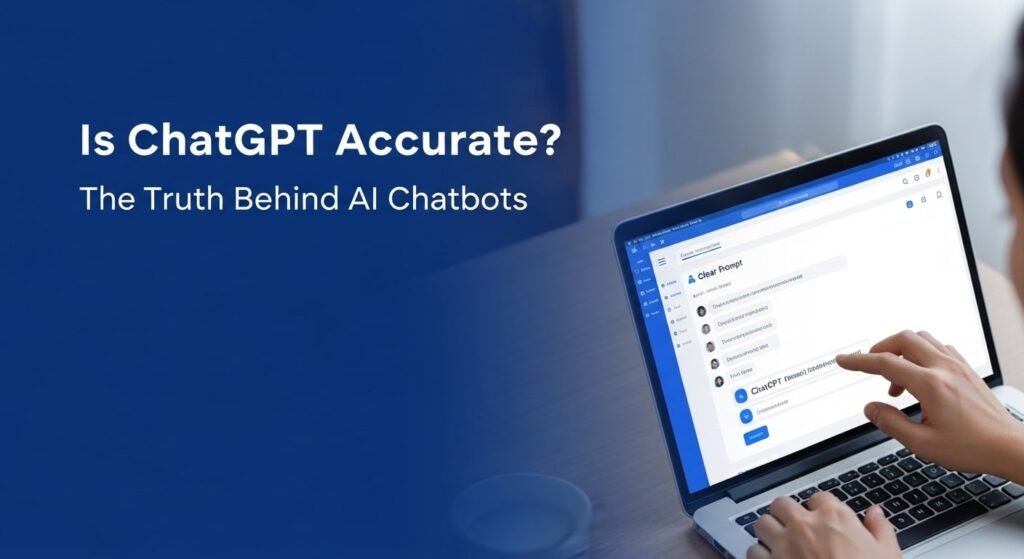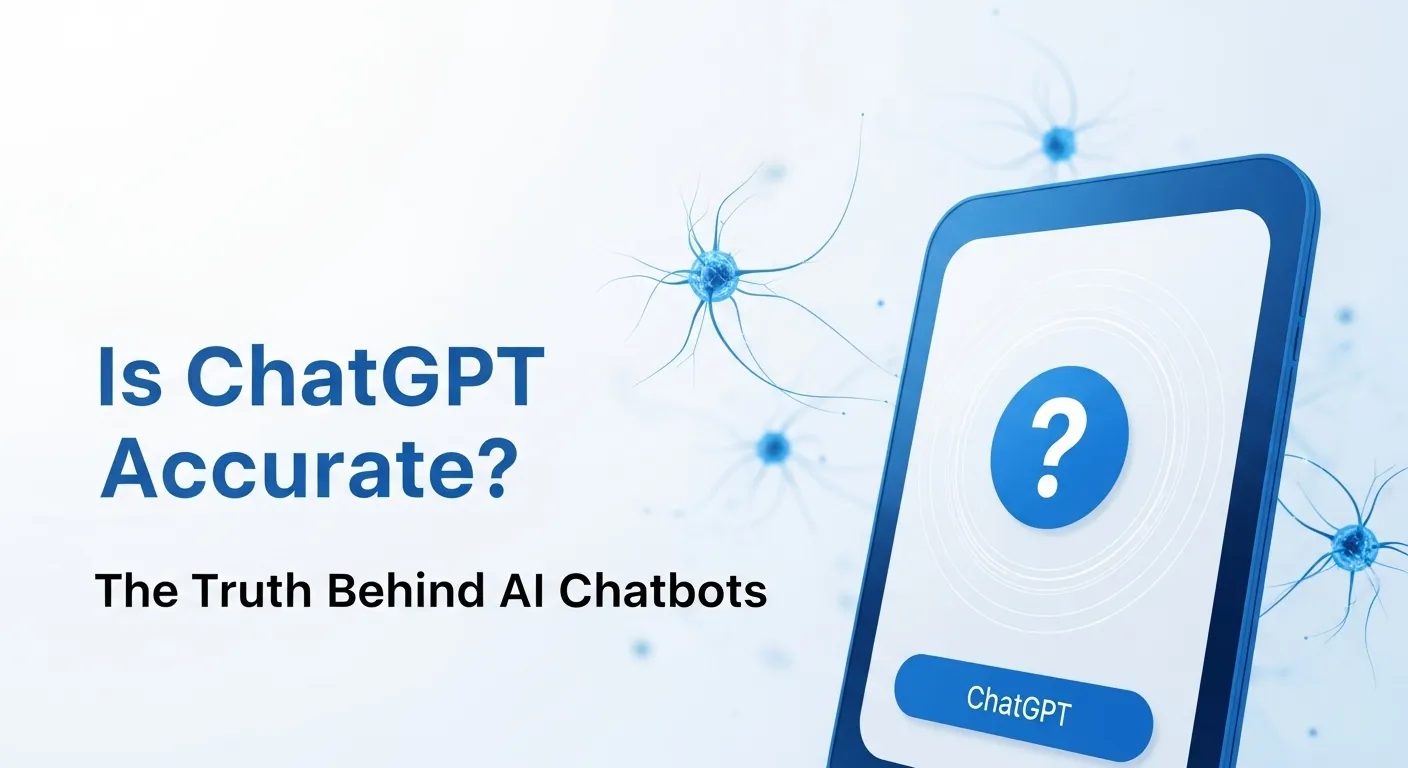ChatGPT, an AI chatbot by OpenAI, answers questions and assists with tasks like writing and coding. Its popularity has soared, with over 800 million weekly users by April 2025. But how accurate is it? This article examines ChatGPT’s reliability using recent data, highlights its strengths and weaknesses, and offers practical tips to get better results. Our goal is to provide clear, up-to-date information for users seeking trustworthy AI answers.

What is ChatGPT?
ChatGPT is a large language model (LLM) based on the GPT architecture. It’s trained on vast datasets, including books, articles, and websites, to generate human-like text. It can explain concepts, write code, or brainstorm ideas. However, its accuracy depends on its training data and how users phrase their questions.
Compare ChatGPT with other models in ChatGPT vs InstructGPT.
How Accurate is ChatGPT in 2025?
ChatGPT-4o, the latest model, scores 88.7% on the Massive Multitask Language Understanding (MMLU) benchmark, making it one of the top-performing LLMs, just behind Claude 3.5 Sonnet. However, accuracy varies by context:
- Medical Queries: A 2023 study showed 72% accuracy in clinical decision-making but only 68% in clinical management, struggling with differential diagnoses.
- Math and Coding: GPT-4’s prime number identification accuracy dropped from 84% to 51% between March and June 2023, showing inconsistency.
- General Knowledge: It excels in well-documented topics, scoring high on standardized tests like the SAT and bar exam.
- Chatbot Arena: In 2024, ChatGPT-4o-latest scored 1365, close to Gemini-Exp-1206’s 1374, indicating strong conversational performance.
| Benchmark/Test | Accuracy | Source |
|---|---|---|
| MMLU (ChatGPT-4o) | 88.7% | Chatbase, 2025 |
| Clinical Decision-Making | 72% | Mass General Brigham, 2023 |
| Prime Number Identification (GPT-4, March 2023) | 84% | Popular Science, 2023 |
| Prime Number Identification (GPT-4, June 2023) | 51% | Popular Science, 2023 |
What Affects ChatGPT’s Accuracy?
Several factors determine how reliable ChatGPT’s answers are:
- Topic Familiarity: It performs best on topics with abundant training data, like history or science, but struggles with niche fields like rare medical conditions.
- Question Complexity: Simple questions (e.g., “What is 2+2?”) are answered correctly more often than complex or ambiguous ones.
- Language: It’s most accurate in English due to its training data. Non-English responses may be less reliable.
- Prompt Clarity: Clear, specific prompts improve results. Vague questions lead to vague or wrong answers.
Common Pitfalls of ChatGPT
ChatGPT has limitations that affect its reliability:
- Hallucinations: It can generate convincing but false information. A 2024 study found GPT-3.5 hallucinated references 39.6% of the time, while GPT-4 did so 28.6%.
- Outdated Knowledge: Its data is limited to September 2021 (or 2023/2024 for newer versions), so recent events may be inaccurate.
- No Source Citations: Unlike search engines, it doesn’t cite sources, making verification difficult.
- Overconfidence: It may present wrong answers confidently, misleading users.
Learn how to spot AI-generated content in How to Detect If Students Used ChatGPT.
How to Improve ChatGPT’s Accuracy
You can boost ChatGPT’s reliability with these strategies:
- Use Clear Prompts: Ask specific questions, like “List three benefits of solar energy with examples,” instead of “Tell me about solar energy.”
- Provide Context: Include details to reduce ambiguity, such as time frames or specific topics.
- Use RAG: Retrieval-Augmented Generation (RAG) pulls external data to improve accuracy for niche topics.
- Enable Web Searches: ChatGPT Plus or Copilot users can use web searches to access real-time data, reducing hallucinations.
- Verify Answers: Cross-check critical information with reliable sources, especially for medical or legal queries.

Explore RAG in Analysis on ChatGPT RAG Integration.
When to Trust ChatGPT
ChatGPT is reliable for:
- General Knowledge: Explaining concepts like gravity or historical events.
- Brainstorming: Generating ideas for marketing or writing.
- Basic Tasks: Writing drafts or summarizing text.
It’s less reliable for:
- Critical Decisions: Medical, legal, or financial advice needs expert verification.
- Academic Research: It fails the CRAAP test (Currency, Relevance, Authority, Accuracy, Purpose) and isn’t a credible source.
- Recent Events: Its knowledge cutoff limits accuracy for post-2021/2023 events.
See how ChatGPT can assist in How to Use ChatGPT for Trademark and Copyright Applications.
FAQs
- Can I trust ChatGPT for facts? It’s reliable for general knowledge but can make errors in specialized fields. Always verify critical answers.
- How often does ChatGPT hallucinate? GPT-3.5 hallucinates 39.6% in scientific reviews, while GPT-4 does so 28.6%.
- Is ChatGPT better than other AI models? ChatGPT-4o scores 88.7% on MMLU, but Claude 3.5 Sonnet may outperform it in specific tasks.
- How can I make ChatGPT more accurate? Use clear prompts, provide context, and enable web searches or RAG.
Conclusion
ChatGPT-4o achieves an impressive 88.7% accuracy on benchmarks like MMLU, but its reliability depends on the topic, question clarity, and language. Hallucinations, outdated data, and lack of citations make it an assistant, not a definitive source. By using clear prompts, RAG, and verification, you can improve its accuracy. Always double-check critical information to ensure reliability.
